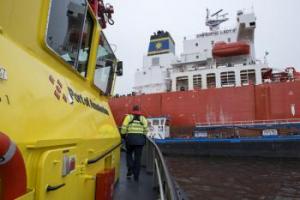Harbour Master
Harbour Masters
Worldwide there are approximately 3,000 merchant ports and the work of the Harbour Master can vary widely from country to country and from port to port even within the same country.

VTS is recognised internationally as a navigational safety measure through the International Convention on the Safety of Life at Sea 74/78 (SOLAS). In particular, the provisions in SOLAS Chapter V (Safety of Navigation) Regulation 12 provides for Vessel Traffic Services and states, amongst other things, that:
IMO Resolution A.1158(32) Guidelines for Vessel Traffic Services describes the purpose of VTS, the regulatory and legal framework for establishing and operating VTS, the roles and responsibilities of Contracting Governments, competent authorities, VTS providers and participating ships and the qualifications and training requirements for VTS personnel.
VTS achieves its purpose by monitoring ship traffic and interacting with ships to provide information or issue advice, warnings, and instructions:
IMO Resolution A.1158(32) also provides the basis for governments to establish the regulatory framework for participating ships, under national law, to:
IALA is recognized as an important contributor to IMO's role and responsibilities relating to VTS and publishes standards and associated recommendations, guidelines and model courses specifically related to the establishment and operation of VTS to contribute to achieving worldwide harmonization of VTS. For further information on VTS refer to the IALA VTS Manual – https://www.iala-aism.org/product-category/publications/manuals/
IALA is a non-profit, international technical association. Established in 1957, it brings together authorities concerned with marine aids to navigation, as well as manufactures and consultants from all parts of the world, and offers them the opportunity to compare their experiences and achievements. IALA’s aim is to harmonize aids to navigation worldwide and to ensure that the movements of vessels are safe, expeditious, cost-effective and harmless to the environment. VTS documentation and standards in the form of standards, recommendations, guidelines, brochures and the VTS Manual are available free of charge for download under the “Publications” tab on the IALA website.
Aids to navigation can take the form of fixed or floating marks that may be lit or unlit, including lighthouses, leading lines, buoys and beacons. A vessel traffic service (VTS) can also be categorised as an AtoN, albeit a very sophisticated and relatively costly one. The mix of AtoN used in a port or waterway is determined by means of a risk assessment, which takes into account the local geography, traffic patterns, vessel size and manoeuvrability, local hydrographic conditions and weather patterns. IALA publications include guidance on maintenance and location of AtoN.
Steve Rushbrook never predicted he would become a Harbour Master, let alone in one of the southernmost ports in the world. His career pathway to becoming a Harbour Master for New Zealand’s Otago Regional Council shows what is possible for those with less conventional backgrounds.
As part of the refurbishment for the operations and maintenance (O&M) base for the Rampion Offshore Wind Farm, Inland and Coastal Marina Systems (ICMS) has installed a floating concrete breakwater within the Port of Newhaven to provide safe berthing facilities for crew transfer vessels (CTVs).
Join the world’s premier professional body for harbour masters and receive up-to-date information on the industry and access to the members' area of the website.